October 31, 2019 | By Margo Hammond
November 9, 10 am-5 pm
USF St Petersburg
Free
Details here

On the morning of October 31, 1993 Edgar Allan Poe, Elizabeth Barrett Browning, William Shakespeare, Aesop, Anton Chekov, Ernest Hemingway and Mark Twain all showed up at Eckerd College, courtesy of the Venue Theatre Collective, which had just been founded in Pinellas Park.
“When you bump into them, don’t hesitate to ask them about their books. They’re dying to know what you think of them,” I told readers in a four-page pull-out section inserted in the St. Petersburg Times, urging them to go meet the “Famous Dead Authors” — and dozens of live authors — at the First Times Festival of Reading.
I boldly called it “The First” even though none of us putting the event together was certain there would ever be a second.
But there was a second and many more. In fact, on November 9, the Times Festival of Reading is returning for the 27th time.
How did it all begin?
In 1993, we picked the worst possible day for the launch. Not only was it Halloween, but it was a stormy Sunday with hurricane-like winds. It’s a wonder anyone showed up.
But come they did. The official attendance count was 10,000 — recorded by the local newspaper of record and the festival’s sponsor, the St. Petersburg Times.
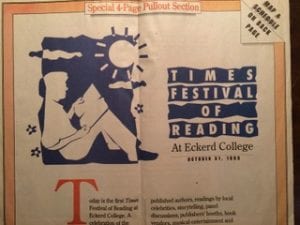
I had been hired as book editor at the Times less than three years before and had been kicking around the idea of organizing an event that would feature local and national authors talking about their newly published books. I imagined a smaller version of the Miami Book Fair International, started in 1984 by the president of Miami-Dade college and a handful of independent bookstore owners working in collaboration with the local public library system. Why couldn’t the St. Petersburg Times sponsor a similar event?
I thought the sprawling Eckerd College campus in south St. Pete would be a great place to stage a reading festival and and Pat Baldwin, the media director at the college, was a perfect partner in crime. She knew all about organizing festivals: First Night, St. Pete’s annual family-friendly New Year’s Eve celebration, was, after all, her brainchild.
Early in 1993, Pat and I travel to Sarasota to get some ideas from Mickey Bazelon Knox, a 78-year-old who was planning her own reading festival at New College. Hers was geared primarily for children, but she was also including a panel discussion for adults. Mickey spent winters in Florida but lived in Washington DC, and knew everyone from janitors to presidents. She told us she’d be happy to convince one of her authors to attend our as-yet-to-be-created festival — the feminist icon Betty Friedan. Betty was Mickey’s cousin. We’d just have to hold our festival the day after her event, i.e., on Halloween.
So, just like that, I had a venue, a date and a headliner.
With that trifecta, I went to Mike Foley, the managing editor at the St. Pete Times to get the newspaper on board. Foley, who kept a bust of Elvis in his office and played guitar in a rock band, loved the idea. He put me in touch with Eddie Moran of the Times marketing department and told her to make it happen.
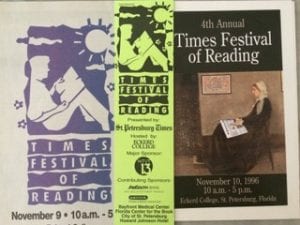
Like the Miami festival, we wanted our festival to offer a smorgasbord of choices, not just a panel discussion, but a cacophony of literary voices at competing times in campus classrooms and auditoriums throughout the day. And we wanted it all to be free.
So in addition to Friedan and Washington Post cartoonist Herblock (who both came courtesy of Mickey), we booked poet laureate and novelist James Dickey, Pulitzer-Prize-winner Tracy Kidder, novelist Bebe Moore Campell and sports writer Ralph Wiley.
We invited a Trinidadian novelist, six romance writers, four mystery writers, two comic writers, three writers specializing in science fiction, three local poets, 11 published Eckerd College professors, two writers of horror (it was Halloween, after all), five authors of children and young adult books and 15 Floridians, including three Native American writers, a Hispanic novelist and and Miami Herald journalist and comic mystery writer Carl Hiaasen.
Despite all that star power, that first festival got off to a shaky start.
The night before, the weather forecast looked grim. Dickey showed up in his cups and stacks of festival programs went undelivered. But the next morning, the author of Deliverance arrived stone-cold sober to his 11 a.m. talk and gave a riveting performance to a packed auditorium. When he finished, the entire room rose as one in wild applause.
Also at 11 a.m., Betty Friedan began speaking on the other side of campus to a standing-room-only crowd.
Meanwhile in another corner of the campus, as high winds blew away any possibility of open-air stages, Pat and her crew (which included recruits from her own family) herded music acts and spoken word performers into the campus’ most cavernous space — Fox Hall — along with all the others who had planned to set up outside. There, sheltered from inclement weather, Pat carved out space for them all: 45 local bookstores and publishers in a Printers’ Row and 27 local community groups at tables stacked with brochures. Throughout the day Tampa Poet Laureate James Tokley Sr.’s booming voice alternated with jazz riffs and folk music while thousands of kids under 12 lined up for a free book.
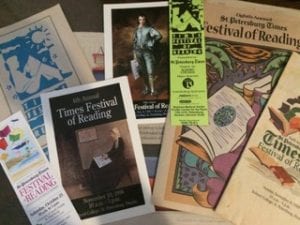
Somehow people made their way to all the venues, quickly filling them to capacity. By day’s end I knew there would be a Second Times Festival of Reading. The festival had been a rousing success. We had proved there was a yearning for readers to meet authors — and vice versa.
The next year we repeated the same formula: more Famous Dead Authors and more nationally known authors came to speak, including Doris Kearns Goodwin, Ed McBain, P.J. O’Rourke, Julia Alvarez, Derrick Bell and Art Buchwald (the latter again courtesy of Mickey). And thanks to great weather, Pat finally got her outdoor festival with stages under the pines, featuring book giveaways to kids, music, theater and poetry.
Tom Robbins, booked into the Eckerd gymnasium to accommodate his huge following, presented his novel Half Asleep in Frog Pajamas and then signed books for three hours. “If I baked you a pineapple upside-down cake,” Robbins told me one of his fans asked, “would you eat it?”
That “Second Annual” festival was held October 23, two days after the author of On the Road died in St. Petersburg at age 46, so we included “A Tribute to Jack Kerouac.” Among the Kerouacans who came to talk about his legacy were Jack’s agent Sterling Lord; Joyce Johnson, who wrote several memoirs about her days with the Beat Generation; Barry Gifford, who wrote the screenplay for Francis Ford Coppola’s film version of On the Road; Ron Lowe, a local musician and Jack’s designated driver, who was with his friend at St. Anthony’s ER the day he died; and, most remarkably, Jan Kerouac, the woman whom Jack had never admitted to siring but to whom he bequeathed his last name and, undeniably, his looks.

I envisioned an annual Kerouac Celebration but when it came time to plan the “Third Annual” festival in 1995, I was met with resistance. “No one is interested in “that drunken writer,” one editor insisted. We did rebook the Famous Dead Authors, but it was the presence of an author who was very much alive — one might even say immortal — that made that third festival so memorable: Anne Rice, in a black wedding gown, a baseball cap and black wig, came to town and set what she described as a personal longevity record for book signing.
We knew we were in for a long day when Rice fans started lining up on campus at 4:35 a.m. next to a hearse to make sure they wouldn’t miss the wildly popular writer of vampire tales. To meet Rice, festivalgoers had to get a ticket — given out free, starting at 11 a.m on the festival grounds — and stand in line. We gave out 800 tickets, turning hundreds of disappointed fans away. On the morning of the festival, the police reported a back-up on I-275 at the 54th Street S. exit as cars streamed toward the campus.
Rice had sent us, diva-like, a list of demands — Hall’s cough drops, Tab, the aforementioned hearse — so we were expecting the worse from her, but as she sat hour after hour greeting her fans with kindness and attention (with only one bathroom break), my admiration for her grew. For nearly 12 hours, downing cough drops and two six-packs of Tab, Rice signed hundreds of books, dozens of T-shirts and a discarded Tab can, talking to each one of her fans as if she were alone in a room with them. She even rescheduled her flight out of St. Petersburg in order to greet all those who were in line, staying on campus until 10:30 p.m., long after the festival officially closed at 5. Her fans reciprocated with gifts, including eyeballs floating in a Baggie, a bottle of Dracula liqueur and framed photos of her New Orleans mansion.
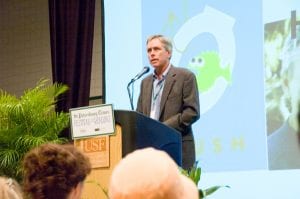
And Rice wasn’t the only attraction that day. Also on hand were NPR commentator and novelist Andrei Codrescu; Russian poet Yevgeny Yevtushenko; the Washington Post’s executive director Ben Bradlee; wise-cracking political columnist Molly Ivins; Robert B. Parker, creator of the Spenser mystery series; Yoruba princess Iyania Vanzant; novelists Madison Smartt Bell and Harry Crews; the soul care expert Thomas Moore and, once again, Carl Hiaasen, who offered up his signature mixture of stand-up comedy and journalistic rant.
Like Hiaasen, many authors have returned to the festival, some multiple times, including Dave Barry, Tim Dorsey, Joyce Maynard, R.L. Stine, Edwidge Danticat, Lisa Unger, Ray Arsenault, James Swain, Jeff Klinkenberg and Les Standiford, all of whom are in this year’s lineup.
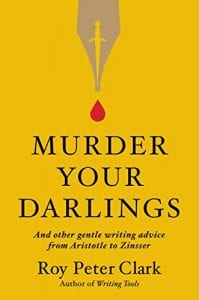
The festival’s most-frequent-presenter award though goes to Roy Peter Clark. This year the writing coach, now retired from the Poynter Institute, will be presenting his latest book, Murder Your Darlings: And Other Gentle Writing Advice from Aristotle to Zinsser in a lively talk that undoubtably will include some impressive turns at the piano.
As the festival grew and the number of festivalgoers swelled, we were always looking for ways to give it a new twist. At the sixth festival set designer Allen Loyd (brought in as a co-producer) designed two giant puppets with the disabled artists of Creative Clay. At the 14th festival, local crossword genius Merl Reagle constructed a puzzle with clues linked to the invited authors that year, including Martina Navratilova, Andy Borowitz and Arianna Huffington.
In 1999 we expanded the festival to two days, then in 2001 scaled it back to one again, but this time on a Saturday rather than the more unpopular Sunday slot. By then we didn’t need to rely on the Sarasota festival — The Times Festival of Reading had become a popular stop on authors’ book tours.
We even drew the attention of the Los Angeles Times who called to ask advice how we pulled off a newspaper-sponsored reading festival (apparently, we’d been the first). In the spring of 1996, the Los Angeles Times Festival of Books was launched, patterned after our formula — lots of authors in competing venues on a college campus. Now in its 24th year, the LA event bills itself as the largest reading festival in the country.
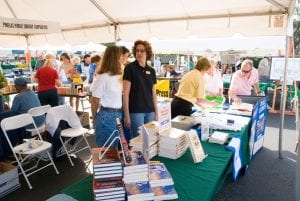
Every year we strove for diversity — both in the type of books presented (fiction, nonfiction, literary and genre) and in the background of the authors. We welcomed best-selling authors (James Patterson and Mary Higgins Clark), high brow authors (George Plimpton, founder of the Paris Review), quirky authors (Kinky Friedman, former leader of the band the Texas Jewboys) and very tall authors (Kareem Abdul-Jabbar). In 1996 local LGBT activist Nadine Smith monitored a panel entitled ‘Gays and Lesbians in America: The Personal and the Political’ that included conservative political commentator Andrew Sullivan; Andrew Holleran, a prominent novelist of post-Stonewall gay literature; and gay activist Candace Gringrich, sister to anti-LGBT rights Newt.
Historians have been popular. In 2001, just a few weeks after 911, readers crowded into Fox Hall to be comforted by historian David McCullough’s descriptions of the hardships early Americans like John Adams (the subject of his biography) went through to create this country. Doris Kearns Goodwin came twice. John Hope Franklin and Ray Arsenault, who now holds the John Hope Franklin chair at USFSP, have both been guests.
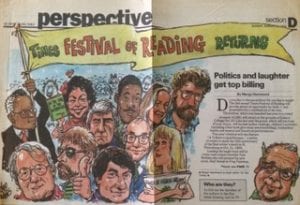
Journalists were omnipresent in those early years. We had both (Robert) MacNeil and (James) Leher (though not at the same time) and some names still all over cable news today: Juan Williams (at Fox); David Gergen (at CNN) and Jonathan Alter (at MSNBC). In 2005 liberal (and maybe a few conservative) festivalgoers crammed into Fox Hall to hear New York Times columnist Maureen Dowd explain how George Bush managed to get reelected. Hundreds were turned away when the hall’s capacity had been stretched to its limits.
Blame, in fact, Maureen Dowd for our decision to seek a bigger venue. After so many people complained they couldn’t get a seat at Dowd’s talk, we moved the festival to its present location: The USFSP campus provided larger venues and new downtown energy.
As the festival grew, so did the complaints. Why wasn’t John Grisham or Stephen King coming? Why didn’t we have more poets? More romance writers? More local authors? More national authors? More children’s book authors? Readers certainly are a critical lot — even when the event is free. I would tell them that they should demand their money back.
I shepherded through 14 festivals. My successor, Colette Bancroft, has delivered 13 more, a remarkable feat considering the financial challenges the newspaper industry has faced. And when the St. Petersburg Times was rechristened the Tampa Bay Times in 2012, the festival didn’t have to change its name.
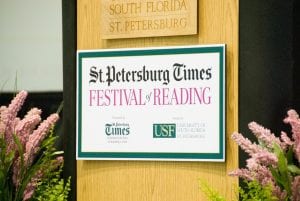
In 2007 I retired from the newspaper, but I haven’t missed a Times Festival of Reading.
One year I was there as an invited author, presenting Between the Covers: The Book Babes Guide to a Woman’s Reading Pleasures, with my co-author Ellen Heltzel. Another year Colette invited me to give a talk about my experience editing and self-publishing Post Scripts: A Writing After Eighty by LaVerne Hammond, a collection of my mother’s newspaper columns.
But mostly I’ve attended as a reader, joining thousands of others, navigating my way across campus to see a favorite author. Now I am the one grumbling that there are too many authors that I want to see, lamenting the fact that I can’t be in two places at once, mumbling that phrase known to all book lovers:
Too many books. Not enough time.


